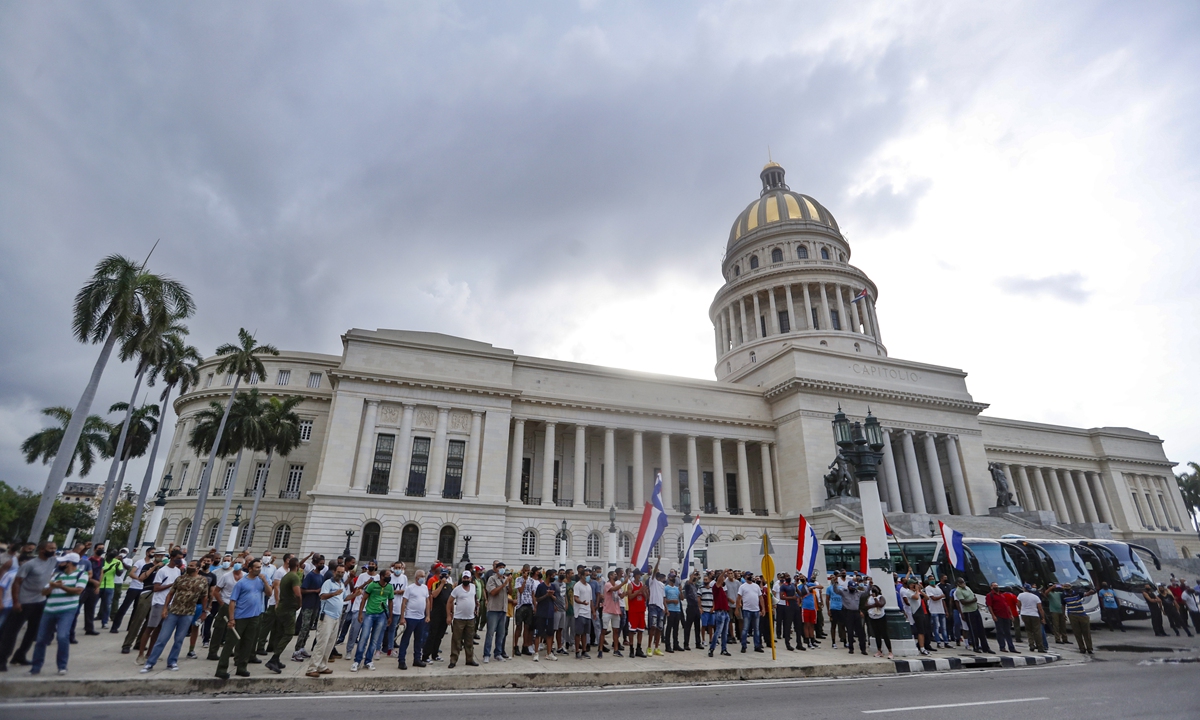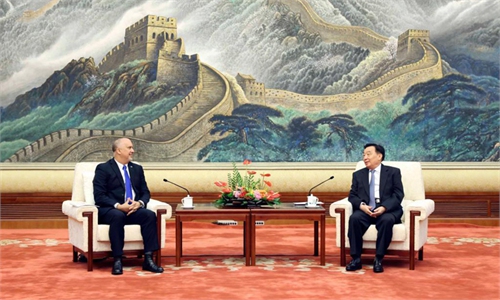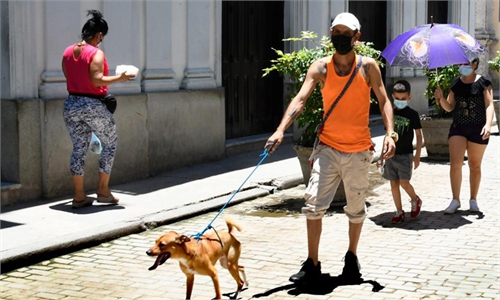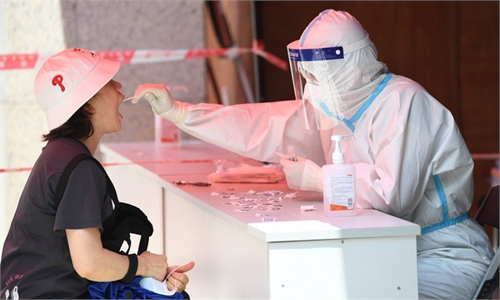Cuba denounces US ‘subversion’
Beijing urges Washington to lift blockade against Havana

Cubans hold their country's flag to support Cuban President Miguel Díaz-Canel in front of the National Capitol building in Havana on Monday amid anti-government protests that were believed to be a US-backed "color revolution" attempt. Photo: VCG
The Cuban Embassy in China on Tuesday denounced the US' unconventional war scheme against Cuba which attempted to provoke the long-awaited "regime change," following the unprecedented protest on Sunday, saying that Cuban people's response was "Homeland or Death, We will win."
According to a statement the embassy sent to the Global Times on Tuesday, the weekend's subversive actions were encouraged and manipulated in the social networks controlled from the US, under the label "SOS Cuba," and the "Florida state government has granted funds to the company that created the label, which is based in Miami."
Political operators of the US government and Twitter used the labels, robot collectives, trolls, which are users coordinated by automated means, in this operation against Cuba, the embassy said.
"The Cuba will soon present copious evidence of these accusations to the United States government and to Twitter," the embassy said.
Cuban Foreign Minister Bruno Rodriguez also blamed US-financed mercenaries for the protest. He called on Washington to confirm or deny that the company with the "SOS Cuba" campaign has received funding from the US state department.
These actions of social violence are part of the unconventional war scheme that US governments have been applying against Cuba to provoke the long-awaited "regime change." This time, the complex situation in Cuba involving the COVID-19 pandemic, the shortage of health supplies and food due to the intensification of the economic, commercial and financial blockade of the US, was taken advantage of, the embassy said.
"Faced with this type of vandalism, written and promoted in detail in US subversion manuals, the response of the Cuban people will continue to be: Homeland or Death, We will win!" the embassy said.
Sunday's protest was the biggest anti-government protest in Cuba, with protesters expressing dissatisfaction with what they believed to be a lack of freedom, rising cases of COVID-19 and a degrading economy. Counter-marches to support the government also took place in several cities.
Cuba is in its worst economic situation since the 1990s, as the COVID-19 pandemic has devastated tourism, and the country has suffered from inflation, power outages and shortages of food, medicine and basic goods.
The situation in Cuba was normal with people's lives proceeding in an orderly manner on Tuesday, and the Cuban government, under the leadership of the Communist Party, continued with its executive functions, the Global Times learned from the Cuban Embassy and people living in Cuba.
A Chinese who lives in Cuba told the Global Times on condition of anonymity Tuesday that police patrolled almost each block in Havana's Playa district where most of his friends live, and people are living their lives in an orderly manner.
He said the protest simultaneously took place in several cities on Sunday, which mainly involved unemployed young people.
"This proves that the protest was premeditated," he said, noting some of the protesters held American flags, chanted typical American slogans such as "Libertad." He and many of his colleagues and friends in Cuba believe the US was behind the protest.
After the protest, several countries including China voiced support for the Cuban government and called on the US to lift the blockade against Cuba.
Mexican President Andres Manuel Lopez on Monday offered to support Cuba with medicines, vaccines and food. He also called for the lifting of the US blockade and condemned interference in the island, the Prensa Latina reported.
On Tuesday, Chinese Foreign Ministry spokesperson Zhao Lijian said China firmly supports Cuba's efforts in combating COVID-19 and maintaining social stability and the US should fully lift its blockade against Cuba, as, just like Cuba said, the US blockade was the root cause of Cuba's problems, including medicine shortage.
China believes that under the leadership of the Cuban party and government, Cuba will surely maintain social stability, Zhao said at a routine press conference.
Some Chinese netizens also went to the commentary section of the Weibo account of the Cuban Embassy in China to express their support to the Cuban people and its government while alerting Cuba of US' incitement and interference in its internal affairs.
"Come on, Cuban people, please be united and let the 'color revolution' incited by the US go bankrupt," a netizen said.
Cuban Ambassador to China Carlos Miguel Pereira told a media conference in May that the US has long used the social network as a tool to subvert Cuba and destabilize Cuba. Social network space has become an important battlefield of ideas.
"The US' attempts and tactics to disintegrate and destabilize Cuban society from within have not changed," he said, noting that the US approaches involve creating uncertainty among young people and then stirring them up.
In Washington, several US officials and politicians repeatedly voiced their support to anti-government protesters in Cuba in a way that seemed to attempt to fan the flames. Senator Marco Rubio has been very active on Twitter, with dozens of tweets every day praising anti-government protesters while attacking the Cuban government, Communist party and socialism. He called on media to report the protest and claimed the protest took place because "socialism is always a disaster."
Some Western media outlets apparently went wild with the protests, claiming thousands marching in Cuba, while the official Cuban media Prensa Latina saying there were only hundreds of protesters.
The Guardian in a Monday report used an AP photo AP which mistook government supporters with anti-government protesters in the caption. Later, the newspaper published a correction, saying the "original agency caption on the image of people on the Máximo Gómez monument incorrectly described them as anti-government protesters. They were actually supporters of the government."



